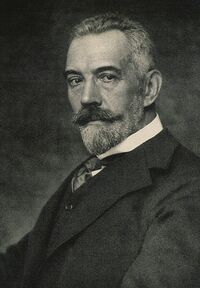Audonia in the First Great War: Difference between revisions
(Created page with "200px|thumb|right|Theobald Strauss, incumbent president of Audonia, played a vital role in ensuring Audonian neutrality during the war Audonia's...") |
No edit summary |
||
| Line 29: | Line 29: | ||
====Audunien Legion==== | ====Audunien Legion==== | ||
==Aftermath== | ==Aftermath== | ||
===Controversies | ===Controversies=== | ||
==Legacy== | ==Legacy== | ||
Revision as of 14:35, 4 July 2022
Audonia's official policy during the First Great War was that of neutrality, guarenteed by its distance from the primary theatre of war and that it was surrounded by Coalition-aligned nations, including active participant Amandine. For much of the war, however, the Audonian military was held at a partially mobilised state in the event that the state was dragged into the conflict, occaisionally being raised to full mobilisation during times of crisis.
Despite its official policy, Audonia supplied and assisted the Galene League both openly and secretly, activities that often brought the state close to conflict with its neighbours, activites that often remain classified to the modern day. Historians often refer to Audonia's situation in the war as 'neutral in name only'.
Pre-war situation
Prior to the outbreak of the war, Audonia was considered by many to be an unofficial member of the Galene League. It held intensely close relations with many members of the League, particularly that of Tyrnica on account of its large Tyrnican-speaking population.
Initially spawned by Audonia's domination in the Rum Gulf following the Continental War in 1936, pre-existing groundwork had already been laid with Tyrnica's material assitance during both it's war of indepdence and the transfer of ownership of Nova Kovaria in 1654 from Tyrnica to Audonia cemented cooperation. Despite Audonia's defeat in the War of the Arabeilline Sea, the nation was considered to possess a still considerable army, which had dissuaded Albrennian and Amandine invasions of the Audonian mainland.
Resentment against the nation's defeat often saw the nation adopt stances contrary to those held by those that had defeated it, including falling in line with the League following its establishment in 1895 whilst much of Marcaeunia adopted pro-Coalition feelings. It was the close relationship that convinced the Tyrnican general staff that the Marcaeunian nations would not pose as great a threat in the war as Audonia and it's allied nations would tie them up before they could make a noticeable difference in the war. Indeed, Albrennian and Amandine war plans included strategies on how to defeat Audonia quickly should it join the war with the League.
The situation in Audonia, however, was one that differed greatly from the ideas of its allies. As early as the formation of the League, successive Audonian governments agreed that joining a Coaltion-League War would be disastorous for the nation, owing to the overwhelming presence of Coaliton-aligned neighbours and the combined weight of the Albrennian and Amandine fleets greatly outmatched that of Audonia's. A series of confidential wargames placed Audonia's best chances as surviving six months into the conflict before its fleet was destroyed to the worst estimates having it last for only two weeks. Though it was agreed the Audonian army was capable of defending the nation, the idea of hosting such a conflict and the projected material cost was not one that lawmakers wished to realise.
Additionally, many considered the fact that Audonia had made no official or vocal pledge to assist the League in any conflict as grounds enough not to participate should such a war break out, however it did not stop the Audonian Assembly from passing the Foreign Enlistment Act 1903, legalising Audonian citizens from enlisting within foreign militaries so long as it was not with nations deemed threatening to the nation.
The Act was generally ignored within the Rythenean portions of Audonia, however upwards of 2,000 Tyrnican Audonians departed Audonia and enlisted in the Tyrnican Armed Forces, the majority often travelling north to King Erich's Land and enlisting there. As a means of inducement, the Audunien Legion was founded in King Erich's Land, ensuring the Audonians remained together and maintained their indepedent culture. Throughout the war, it's thought at least 19,000 Audonian's served in the Legion, it's largest strength at 9,000 in 1910. The repatriation of these volunteers proved to be a diplomatic issue for the Audonian government later on.
